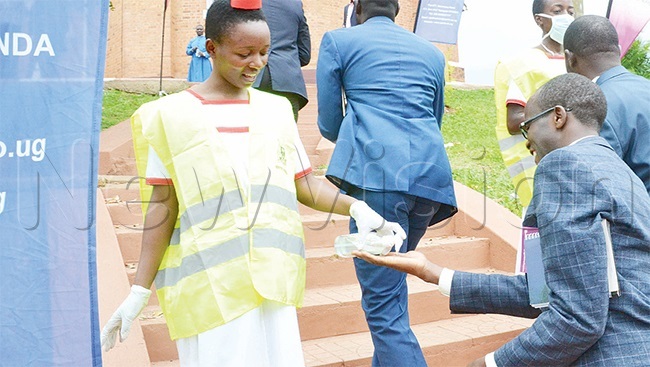Looking out for Coronavirus' silver lining
For the first time in a very long time, my neighbourhood actually had some quality time in their homes. Thanks to the coronavirus.
 Empty streets of downtown Kampala that became serene for the first time in decades because of the corona lockdown that was announced on March 18.
Empty streets of downtown Kampala that became serene for the first time in decades because of the corona lockdown that was announced on March 18.
This month has been a blessing, and can we all please go on like that? Can these pastors stop playing a mean, loud Saul and turn into a very quiet and peaceful Paul?
And maybe Christians will realise that you do not have to pray and sing all night for God to keep you alive and healthy; He's got your back in all circumstances, like He has done through the lockdown.
And as for those pastors that spring up almost every week and at every corner, maybe the faithful will realise they can actually get on very well without them. With the prospect of social distancing continuing for the foreseeable future, those folks with nothing to do hopefully won't gather to do it in those typically biwempe churches.
 health official sanitising hands of guests who attended the consecration of Archbishop Stephen Kaziimba at Namirembe Cathedral early this year year. COVID-19 has made such personal hygiene practices popular.
health official sanitising hands of guests who attended the consecration of Archbishop Stephen Kaziimba at Namirembe Cathedral early this year year. COVID-19 has made such personal hygiene practices popular.
NOISE AND AIR POLLUTION
All over the world, stories have been told of how much pollution has decreased. That the Himalayas can now be seen from over 200km away, and that Kenyans that have never seen Mt Kenya could now see it from Nairobi, 140km away.
Ugandans find it very difficult to accept that Kampala is a very polluted city, and many insist on their right to burn rubbish and drive their 20-year-old ramshackle vehicles on the streets. But the air in Kampala has improved drastically over this one month, mainly because those ramshackle vehicles are off the roads.
Can we all keep it that way? Can the bored Kampala Capital City Authority askaris start enforcing the no-burning rubbish in the city ordinance?
And the traffic Police impound those pollution emitting DMCs? Or we might have to continue wearing facemasks for a long time to come.
The lockdown period has also seen the absence of loud noise from pubs that have invaded our residential areas. Najjeera peeps, who probably have the highest pub per capita in Kampala, have been able to sleep at night. And Nexus has not been
responsible for the worst traffic jams in the city. Let that continue, touch wood.
WEDDINGS AND FUNERALS
A lot has been said about the ‘scientific weddings' of less than 10 people, and how it is the new norm. But will it continue after the lockdown and when virus is under control? It will probably take more than a year of social distancing before people accept that big weddings are not really that cool.

The wedding industry is huge everywhere, and will most probably continue to be big.
But a sizeable downsizing could be on the books, especially if meetings are discouraged.
Meetings are the real culprits here, and if the intending couple know there will be no fundraising meetings, then the urge to be scientific will become a reality.
Funerals are when people join the bereaved families to grieve the departed. It is a welcome gesture that has been observed for thousands of years, but it can be a burden for the bereaved.
Especially when all the several dozens of people that gathered for the funeral eventually leave, and emptiness is left, most times with a deep hole in the pocket, too.
What has happened during the lockdown is that people have collected mabugo, which have been passed on to the bereaved. And life will go on.
FINANCIAL DISCIPLINE
It is a generally accepted fact that Ugandans do not save very much, if at all. This came into sharp focus during this lockdown, when people ran broke barely a week into it. The only people smiling through the lockdown were probably the moneylenders, they were doing roaring business.
Will this teach Ugandans to be more disciplined about their finances?
Maybe, because there are too many people living day today, but still obsessed with ostentatious consumption. If COVID-19 teaches us anything, hopefully it will be not to spend more than we earn, or even spend everything that we earn; and that we have to plan for a rainy day.
NATION OF FEWER TRADERS
No figures are readily available, but Uganda must be up there as having the greatest percentage of traders in an economy; with most of them getting cheap goods from either China or Dubai.
These fellows almost single-handedly determine the value of the shilling to the dollar, which goes down every time they use dollars to important the fake stuff they sell to undiscerning Ugandans.
And then they have the nerve to complain that the dollar is too high!
But the last we heard of them, they had imported the virus to Uganda, literally.
It is some sort of karma that COVID-19 has messed them up real good, and the importation of cheap goods from China or Dubai has more or less dried up.
So what are they going to do? Find something productive to do, that's what. Maybe now downtown Kampala won't be
full of cheap Chinese stuff, thanks to COVID-19, which came from China. Told you about karma.
RELATIONSHIPS
The lockdown has made couples spend more time together than has happened in more than a generation. Although there has
been the unfortunate increase in domestic violence, it has been a time when a couple had a chance to learn whether they can actually live together, or not.

Many were the married couples that barely made it through the honeymoon, and quickly went back to their jobs or their lives without the spouse.
But the lockdown meant they had to spend time in each other's space, and in some cases they were children added, too. So after it is all over, either we will see a rash of weddings, or cancelled engagements.
With social distancing bound to be with us for some time, dating will be a whole new ball game, and no one really knows what the rules will be.
Is there a Ugandan version of Tinder? Wait for it to get very busy, as singles look for companionship on the world
wide web. So we will see people meeting in the virtual world, and tell each other their innermost secrets, why they hate
fish, and when they had their first kiss. All before actually meeting face to face.
BETTER HEALTH
Everyone, or almost everyone, now knows that washing ones hands can be the difference between getting sick and staying alive. Will this be abandoned after covid-19 COVID-19 is tamed?
Not likely, it has taken a pandemic to make people realise that hygiene is an important part of being alive. And you can now tell off that bloke that didn't wash his hands after using the bathroom, without being accused of having lugezigezi.
And all those we have seen jogging and exercising along the roads? It might fall off when the bodas and taxis return, and when the Northern Bypass is again full of cars. But luckily all those ‘slay joggers' will have seen the benefits of exercise, and it will not be just the bazungu jogging on our streets, post-corona.
NEW HEROES
When the going gets tough, the tough get going. And there is no better time to see who is tough than in a time of crisis. COVID-19 has shown us the true heroes of this country, and they largely come in the faces of the different women that have been at the frontline of the fight.
The likes of health minister Dr. Jane Aceng, the permanent secretary Dr Diana Atwine, and Dr Monica
Musenero, the lady that helped bring Ebola to its knees in West Africa. These are the real heroes.
And the villains? That's easy, those Members of Parliament that allocated themselves sh10b, claiming they were also fighting COVID-19. And their boss, the Speaker, for defending their greed. We shall not forget you.
NEW NAMES
There is a video clip making the rounds, pretending to be from the future, when children born during these times have grown up and are in school. As the ‘teacher' does the roll call, the names of the kids is a reminder of what happened: names like Sanitiser Ainemogisha, Corona Ayebare, Quarantine Twinomujuni, Lockdown Mbabazi, Virus Mugisha, Nankunda Facemask and so on.